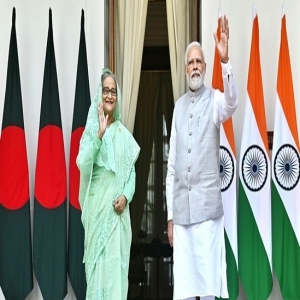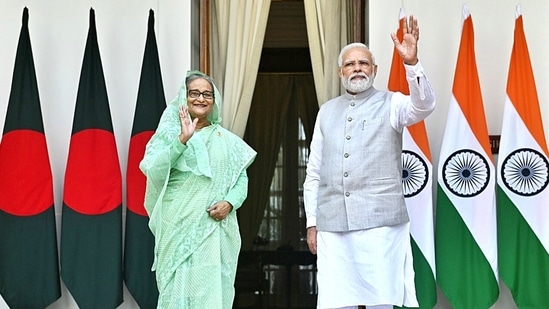
.jpg) Aakash
Aakash

The recent political turmoil in Bangladesh, marked by the ousting of Sheikh Hasina, has sent shockwaves across South Asia. What initially seemed like a domestic upheaval appears to be part of a broader geopolitical chess game under its many layers, with significant implications for the entire region, particularly India. As Bangladesh grapples with the aftermath of its sudden leadership change, there is growing concern that the destabilisation of its democracy could foreshadow similar challenges in India.
Sheikh Hasina, Bangladesh's now-former Prime Minister, was more than just a political leader; she was a bulwark against rising Islamist extremism and a steadfast ally of India. Upon her rise to power in 2009, her government maintained a delicate balance, even using force to ensure that Bangladesh did not fall into the hands of extremist forces. Bangladesh had adopted an India-first approach. However, her sudden resignation under pressure, allegedly fueled by external forces, has left a power vacuum that threatens to plunge the country into chaos.
For India, this development is alarming. Hasina's ouster not only removes a key partner in the region but also destabilises a nation whose stability is crucial to India's security, particularly in the sensitive northeastern states. The possibility of Bangladesh becoming a breeding ground for extremist elements or falling under the influence of hostile powers like Pakistan and China is a nightmare scenario for New Delhi. This could lead to increased terrorism, border conflicts, and economic instability, all of which would directly destabilise the already precarious situation in India.
There are strong indications that Sheikh Hasina's removal was not merely a result of internal discontent but was significantly influenced by external forces. Some Indian security officials have speculated that Hasina's ouster may be a "direct retribution", possibly due to India's recent diplomatic engagements. This theory, while unconfirmed, raises troubling questions about the role of foreign powers in the internal politics of South Asian nations. Keeping India's favourability, or rather the lack of it among all the major superpowers, it is possible for everyone to take advantage of it. The stick has already been dangled before India.
The Bangladesh crisis serves as a stark reminder of previously used tactics often used to destabilise governments. If true, this development signals a dangerous trend where democratic processes can be undermined by external powers. For India, this is a chilling prospect, as it suggests that no democracy in the region is immune to such interference.
The destabilisation of Bangladesh's democracy is not just a regional concern; it could have direct repercussions for India. The methods allegedly used to unseat Hasina—such as leveraging internal discontent, manipulating protests, and exploiting judicial decisions—are eerily reminiscent of tactics that could be employed in India. The rise of protests and civil unrest in India following the atrocious attitude of the current regime already presents significant leverage to any foreign body trying to infiltrate the country. The Bangladesh crisis should serve as a wake-up call for Indian policymakers to safeguard the nation's democratic institutions against similar attempts at destabilisation.
India's democracy, the world's largest, has always been a complex and vibrant system, but it is not without its vulnerabilities. While largely peaceful, the recent farmers' protests, which were sparked by new agricultural laws and led to widespread demonstrations and clashes with security forces, showed how internal discontent can quickly become a flashpoint for more significant political struggles.
The lack of adequate social safety nets and the indifference of the government to the plight of the lower classes have sparked unrest in various parts of the country. This growing discontent, if left unchecked, could create a fertile ground for external agencies to foment instability. History has shown that marginalised communities when pushed to the brink, can become vulnerable to radicalisation and manipulation by external actors seeking to destabilise the state.
Hasina's stratagems, highly evocative of our current regime, through which she suppressed all opposition, muted free press, and strong-armed democratic institutions recoiled on as discontent overflowed the threshold. The Bangladesh crisis underscores the need for India to fortify its democratic institutions and be vigilant against any attempts to destabilise them. This includes ensuring the independence of the judiciary, maintaining a free and fair press, and safeguarding the integrity of elections. Additionally, India must remain cautious of foreign influence, whether it comes in the form of diplomatic pressure, economic sanctions, or covert support.
Furthermore, India's foreign policy needs to adapt to this new reality. None of the Indian neighbours unconditionally support it, which is exacerbated in no small measure by the self-centered and more often than not aggressive approach of the current government. Strengthening ties with neighbouring countries and supporting their democratic processes should be a priority. By helping to stabilise the region, India can also protect its own democracy from the ripple effects of crises like the one unfolding in Bangladesh.
The crisis in Bangladesh is more than just a national tragedy; it is a test of resilience for the entire South Asian region. For India, it is a stark reminder of the fragility of democracy and the constant threats it faces from both within and outside its borders. As the situation in Bangladesh continues to evolve, India must take proactive steps to safeguard its own democratic institutions and support those of its neighbours. The future of the region depends on it.